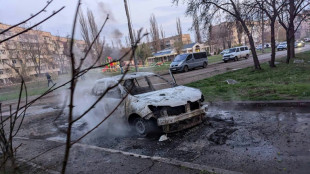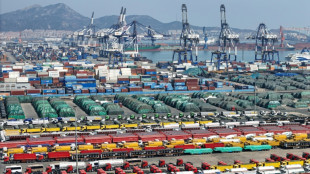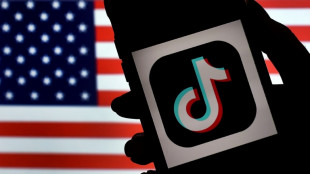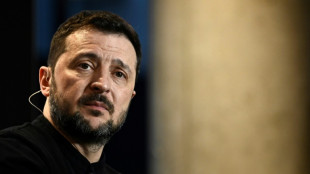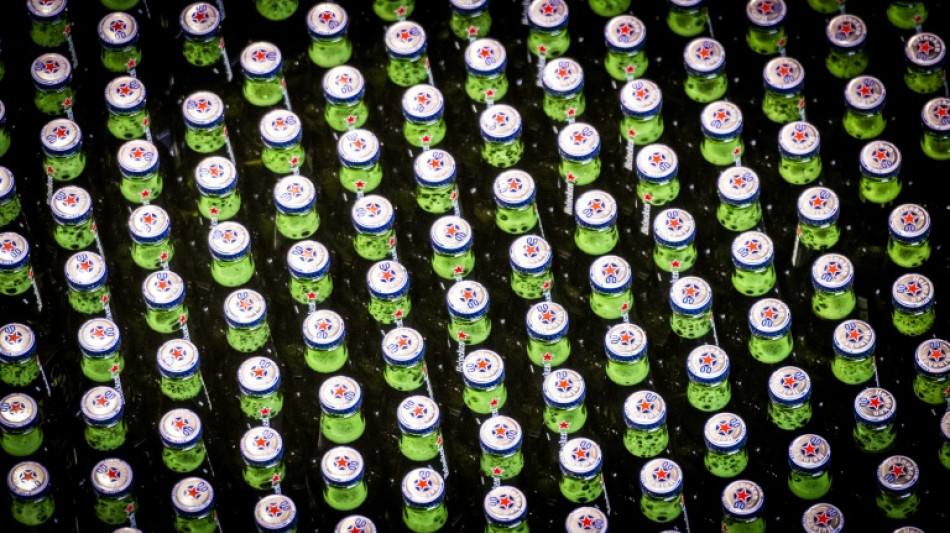
| RBGPF | 1.48% | 69.02 | $ | |
| AZN | -7.98% | 68.46 | $ | |
| RYCEF | -15.29% | 8.5 | $ | |
| CMSC | 0.27% | 22.32 | $ | |
| BTI | -5.14% | 39.87 | $ | |
| RELX | -6.81% | 48.16 | $ | |
| RIO | -6.9% | 54.66 | $ | |
| GSK | -6.82% | 36.52 | $ | |
| VOD | -10.24% | 8.5 | $ | |
| NGG | -5.18% | 65.97 | $ | |
| SCS | -0.42% | 10.695 | $ | |
| BP | -10.37% | 28.395 | $ | |
| BCC | 0.81% | 95.4 | $ | |
| CMSD | 0.79% | 22.85 | $ | |
| BCE | 0.26% | 22.72 | $ | |
| JRI | -7.55% | 11.92 | $ |

Heineken, Carlsberg join Russia business exodus
Beer makers Heineken and Carlsberg announced Monday that they would pull out of Russia, joining a foreign business exodus following Moscow's invasion of Ukraine.
The brewers had already halted the sale and production of their flagship brands -- Heineken and Carlsberg -- in Russia and suspended new investments and exports to the country earlier this month.
In similarly worded statements, the companies said they decided to offload their businesses in Russia following a "strategic review" of their operations there.
They are following hundreds of Western firms that have closed shops and offices in Russia since the war started, a motley list that includes famous names such as Ikea, Coca-Cola, Goldman Sachs and McDonald's.
"We are shocked and deeply saddened to watch the war in Ukraine continue to unfold and intensify," Heineken, the world's second biggest brewer, said in a statement.
"We have concluded that Heineken's ownership of the business in Russia is no longer sustainable nor viable in the current environment," said the Dutch company, which employs 1,800 people in Russia.
"As a result, we have decided to leave Russia."
Heineken said it would aim for an "orderly transfer" of its business to a new owner in compliance with international and local laws and would not take any profit from the transaction, which will cost the company 400 million euros ($438 million) in exceptional charges.
Heineken is the third-biggest brewer in Russia, where it makes the Zhigulevskoe and Oxota brands for the local market. Its other foreign brands include Amstel, Tiger and Strongbow cider.
A Dutch investor association, VEB, had criticised the brewer for "not really leaving" Russia following its previous announcement about halting Heineken sales earlier this month.
- Guaranteeing salaries -
Heineken said Monday it would continue on reduced operations during a transition period to reduce the risk of nationalisation and "ensure the ongoing safety and wellbeing of our employees".
The salaries of its 1,800 employees in Russia will be paid through to the end of 2022.
Danish rival Carlsberg, which condemned the invasion, said Russia was one of its main markets, with 8,400 employees.
Carlsberg owns Russian brewer Baltika Brewery, whose employees represent a fifth of the beer-maker's global workforce.
"The war in Ukraine, and the escalating humanitarian and refugee crisis, shocks us all," CEO Cees 't Hart said in a statement.
Hart said the company made "the difficult and immediate decision to seek a full disposal of our business in Russia, which we believe is the right thing to do in the current environment".
The company said it expects to incur a "substantial" loss from its departure from Russia, noting it generated revenue of 6.5 billion Danish kronor ($957 million, 874 million euros) and an operating profit of 682 million kronor.
Revenues from the Russian operations will no longer be included in the company's earnings and the impact of its departure will be outlined at a later date.
"We deeply regret the consequences of this decision for our 8,400 employees in Russia," Hart said.
- Ukraine pressure -
Russia has been hit by an onslaught of economic sanctions but foreign companies have also faced public pressure, and calls from the Ukrainian government, to leave Russia.
Some companies have remained in Russia, citing concerns about the fate of their employees or depriving ordinary Russians of vital goods.
Ukrainian President Volodymyr Zelensky used an address to France's parliament last week to call on French companies still working in Russia to "stop sponsoring" aggression against his country.
Car giant Renault subsequently announced an immediate suspension of operations at its Moscow factory.
But the chief executive of French retail giant Auchan, Yves Claude, defended the company's decision to remain in Russia, citing the need to keep staff employed.
Ukraine called for a global boycott of Auchan.
burs-lth/cdw
Ch.Schaack--LiLuX
